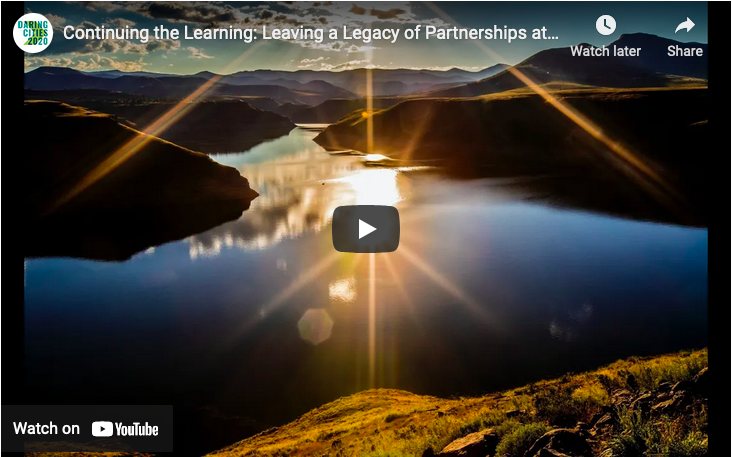
In order to access the video, you must create an account on Daringcities.org or log-in.
Whatever the reason, exiting from a project, program, country, or partnership is no easy task for anyone involved. Numerous NGOs and city partners are facing the challenge of closing projects and program and withdrawing from countries and partnerships while still ensuring lasting changes contributing to international targets (such as SDGs etc.). It is therefore our responsibility to build long and sustainable initiatives.
How does one ensure that initiatives achieve substantial and measurable improvements long after a project has ended? How do projects ensure systematic institutional shifts that leave a long-lasting impact? How does an initiative ensure ongoing learning that continues well into the future? These are just a few of the questions that the Future Resilience for African CiTies And Lands (FRACTAL) project as well as the Educational Partnerships for Innovation in Communities – Network (EPIC-N) have considered in their design and are taking forward.
A growing network of African cities since 2017 have been implementing the EPIC model locally to great effect while simultaneously addressing a number of SDGs and the notion of inclusivity. This ever-expanding network of local government adopters of the EPIC model is now known as the EPIC Africa regional network. At its core, the EPIC model is a simple yet powerful and time-tested tool that brings the intellectual and skill-based resources embodied in local university faculty and students to the service of local governments and communities as a means of enhancing local government capacity to address any number of issues such as adaptation, enhancing resilience, flooding, disaster management, waste management and much more. Though it was created in the US in 2009, the model has proven to be sufficiently flexible and fully capable of conforming to local norms and customs in widely diverse settings and circumstances internationally.
Similarly, FRACTAL is a trans-disciplinary group of researchers and city officials from around the world who actively aim to advance scientific knowledge about regional climate responses to human activities. Together researchers and practioners are working to co-produce relevant knowledge that will support resilient development pathways and enable decision-makers to better integrate pertinent climate knowledge into their resource management decisions and urban development planning.
This session brings together local government officials, academics and members of both initiatives in an interactive panel-style session.
Viewers will learn about and observe discussions on:
-
-
- The biggest barriers and opportunities to “continuing the learning”
- How this learning model fits local level knowledge needs
- How the EPIC model represents a transformative paradigm for the way that universities operate and relates to the needs of local governments and communities where they reside
- The reaction of local government officials and community leaders to both the EPIC and FRACTAL process
- The importance of building relationships/connections between different disciplines
- Reflecting deeply, sharing learnings and methods for building a legacy at local level long after a project or initiative has ended
-
Moderator
-
-
- Dr. Meggan Spires, Senior Manager, Climate, Energy and Resilience, ICLEI Africa Secretariat, South Africa
-
Panelists
-
-
- Dr. Anthony Socci, Senior Lead for International Resilience and Adaptation Policy, U.S. Environmental Protection Agency’s Office of International and Tribal Affairs (OITA), USA
- Elizabeth Bernhardt, Programme Officer and Coordinator UN Global Adaptation Network (GAN), Climate Change Adaptation at UN Environment Programme, Kenya
- Mzime Ndebele-Murisa, Program Specialist, START, Zimbabwe
- Gilbert Siame, Director of the Centre for Urban Research and Planning University of Lusaka, Zambia
- Dr. Chris Jack, Deputy Director, Climate System Analysis Group (CSAG), South Africa
-
